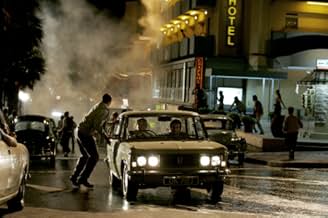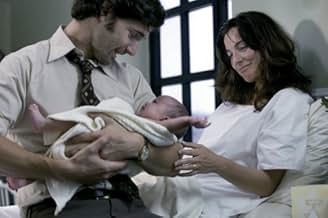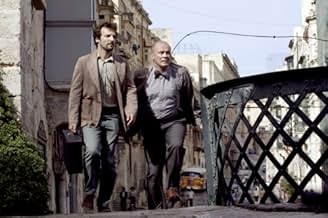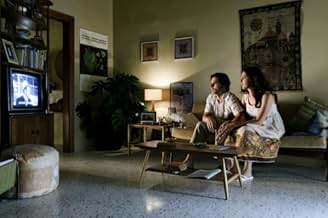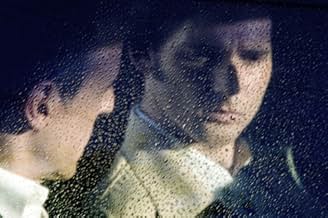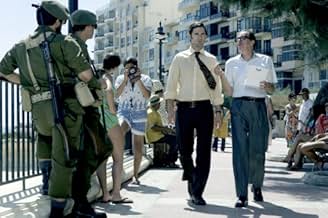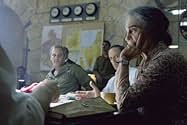Munich
Inspiré de la véritable histoire des évènements qui ont suivi la prise d'otages de Munich et des cinq hommes choisis pour assassiner les responsables de ce jour fatidique.Inspiré de la véritable histoire des évènements qui ont suivi la prise d'otages de Munich et des cinq hommes choisis pour assassiner les responsables de ce jour fatidique.Inspiré de la véritable histoire des évènements qui ont suivi la prise d'otages de Munich et des cinq hommes choisis pour assassiner les responsables de ce jour fatidique.
- Réalisation
- Scénario
- Casting principal
- Nommé pour 5 Oscars
- 14 victoires et 75 nominations au total
Marie-Josée Croze
- Jeanette the Dutch Assassin
- (as Marie-Josee Croze)
Valeria Bruni Tedeschi
- Sylvie
- (as Valéria Bruni Tedeschi)
Amos Lavi
- General Yariv
- (as Amos Lavie)
Avis à la une
Ever since he has journeyed into serious films (starting with "Empire of the Sun" and then "Schindler's List"), Steven Spielberg has been searching for a method of making violence unattractive to moviegoers. "Schindler's List" was, of course, shocking, but this first attempt at strong violence did not quite have the intended effect. I know that a lot of people (including me) feel saddened by the film, but SL's violence could seem distant at times, like the audience was merely an observer. "Saving Private Ryan" was the second great attempt at making moviegoers detest violence, but this seemed easily dismissed as a war film, showing events that would probably never happen again, like showing violence in a distant universe. Munich is his latest effort, and it shows Spielberg's feeling that his previous films, although progressive, had not quite 'hit the mark'.
The violence shown in Munich is, perhaps, the most brutal realistically intentioned violence ever shown on film. I say 'realistically intentioned' because, like the average moviegoer, I have not witnessed people getting shot or blown up, so I don't know what those events would actually look like. There are many signs in the film that Spieberg is trying to improve on his earlier efforts. The guns in the film are REALLY loud when fired. This has the effect of putting you in the fight, making it more intimate when someone IS shot. The bullet wounds and remains after explosions are quite gruesome. When someone dies in this film, no matter what side they are on, you feel no happiness, no relief or awe. You feel a sense of death, nothing dramatic, just blank and empty. For this reason, Munich is one of the most important films to have come out, and perhaps it is Spielberg's best ('Raiders' is too superhuman to be included on that list). Spielberg deserves the best director for this one.
The violence shown in Munich is, perhaps, the most brutal realistically intentioned violence ever shown on film. I say 'realistically intentioned' because, like the average moviegoer, I have not witnessed people getting shot or blown up, so I don't know what those events would actually look like. There are many signs in the film that Spieberg is trying to improve on his earlier efforts. The guns in the film are REALLY loud when fired. This has the effect of putting you in the fight, making it more intimate when someone IS shot. The bullet wounds and remains after explosions are quite gruesome. When someone dies in this film, no matter what side they are on, you feel no happiness, no relief or awe. You feel a sense of death, nothing dramatic, just blank and empty. For this reason, Munich is one of the most important films to have come out, and perhaps it is Spielberg's best ('Raiders' is too superhuman to be included on that list). Spielberg deserves the best director for this one.
Munich may just be Spielberg's greatest accomplishment ever and it isn't a sweeping epic like you'd expect, but a patient psychological thriller that sneaks up on you and takes you and shakes you. It not shy away from blood, politics or nudity in its portrayal of events and this makes it extremely intense, absorbing and occasionally very violent.
The first half of Münich is not altogether different from a heist drama; a group of diverse men with different skills team up to accomplish a mission. They get to travel across Europe, make deals, infiltrate suspect facilities and manufacture explosive devices. Unlike heist films, however, their mission is not for personal gain, but for the government. They are to assassinate eleven Arabs who were alleged to be behind terrorist attacks like Münich 1972. So the more accessible part of the film sees Bana and his men botch their way through a hit-list as inexperienced hit-men, fumbling and trembling with the weight of this somber new task.
This part is so extraordinarily well-handled and engaging with a tone so tense and shadowed by politics and ethical dilemmas that every slight pause is mistaken for humour. It is also an excellent portrayal of an era - the 1970s - with great eye for detail, all carefully sewn together by a master tailor (Spielberg). It is a fantastic piece of film-making.
While Munich keeps you interested throughout, it gradually loses its fresh thriller edge by opting for more typical scenarios. Eric Bana's character goes through emotional struggles because he finds it too hard to kill people. He thinks about his family--his wife has just had a baby girl. He wonders if he is doing the right thing. He starts sympathizing with the Arabs. He wonders if they killings will stop once he has completed his mission. Everything is classic and you saw it coming. It needs to be present in the film for a balanced portrayal but the hackneyed formula with which it is expressed is disappointing. It started so promising, after all.
Sadly, the culmination of this slightly hackneyed recipe manifests itself in the final scene of the film and it is absolutely dreadful and drags the whole film down by at least one star - but overall this is superb quality that is carried by a strong ensemble cast (Geoffrey Rush, Daniel Craig) although it is ultimately Bana's show. He captures the inner turmoil and hesitation of his character in the most believable way, making Munich into a worthwhile adventure for its performances alone. But most importantly, it dares to asks questions.
8/10
The first half of Münich is not altogether different from a heist drama; a group of diverse men with different skills team up to accomplish a mission. They get to travel across Europe, make deals, infiltrate suspect facilities and manufacture explosive devices. Unlike heist films, however, their mission is not for personal gain, but for the government. They are to assassinate eleven Arabs who were alleged to be behind terrorist attacks like Münich 1972. So the more accessible part of the film sees Bana and his men botch their way through a hit-list as inexperienced hit-men, fumbling and trembling with the weight of this somber new task.
This part is so extraordinarily well-handled and engaging with a tone so tense and shadowed by politics and ethical dilemmas that every slight pause is mistaken for humour. It is also an excellent portrayal of an era - the 1970s - with great eye for detail, all carefully sewn together by a master tailor (Spielberg). It is a fantastic piece of film-making.
While Munich keeps you interested throughout, it gradually loses its fresh thriller edge by opting for more typical scenarios. Eric Bana's character goes through emotional struggles because he finds it too hard to kill people. He thinks about his family--his wife has just had a baby girl. He wonders if he is doing the right thing. He starts sympathizing with the Arabs. He wonders if they killings will stop once he has completed his mission. Everything is classic and you saw it coming. It needs to be present in the film for a balanced portrayal but the hackneyed formula with which it is expressed is disappointing. It started so promising, after all.
Sadly, the culmination of this slightly hackneyed recipe manifests itself in the final scene of the film and it is absolutely dreadful and drags the whole film down by at least one star - but overall this is superb quality that is carried by a strong ensemble cast (Geoffrey Rush, Daniel Craig) although it is ultimately Bana's show. He captures the inner turmoil and hesitation of his character in the most believable way, making Munich into a worthwhile adventure for its performances alone. But most importantly, it dares to asks questions.
8/10
Gandhi said, "An eye for an eye only makes the whole world blind." What distinguishes justice from vengeance? This echoes throughout Steven Spielberg's "Munich". "Munich" is powerful and perhaps Spielberg's most compelling and thought provoking work. He weaves a tapestry of political and social threads focusing on terrorism and the cost of violence. "Munich" is truly amazing in balancing linear storytelling and horrific acts of violence, demonstrating the impact of the aftermath. Spielberg's "Munich" seen through the eyes of Eric Bana's Avner is a powerful allegory that even in the most just and noble fights against terror we eventually become that which we despise. "Munich" really serves as a reminder. Mossad team leader Avner played by Eric Bana is absolutely riveting as the man who begins this righteous cause only to find that the cost is his soul. Anver asks, "When does it ever end?"
At the 1972 Olympic Games in Munich, Palestinian terrorists brutally murdered the Israeli wrestling team. This political statement was seen around the world and depicted in gory detail by Director Spielberg. Based on the book "Vengeance" by George Jones, the screenplay by Tony Kushner and Eric Roth tells the story of the aftermath of this tragedy. A great Lynn Cohen who plays Prime Minister Golda Meir says, "Every civilization finds it necessary to negotiate compromises with its own values." Poetic words for what follows are a search and destroy mission. The Mossad assembles a team lead by Avner (Bana) to track down and kill with extreme prejudice all those involved in the terrorist action in Munich. 11 names are identified for execution. These executions are also intended to serve as statements. Anver though an inexperienced operative and not an assassin is selected for the covert mission by Ephriam (the great Geoffrey Rush) for being a strong and effective leader of men. The assassin team is composed of Steve (Daniel Craigthe next James Bond), Carl (Ciaran Hinds), Robert (Mathieu Kassovitz), and Hans (Hanns Zischler). They are dissociated from the Mossad, i.e. they technically don't exist.
In accepting the lead, Avner must leave his beautiful and pregnant wife Daphna (a very strong Ayelet Zorer) for what could be a number of years. Carl has his doubts about Avner, telling him that he was chosen because he is a "good soldier". Soon Carl respects Avner for his quiet force and conscience. Attack of conscience and paranoia soon engulf the team as they become entrenched in the world of underground intelligence for hire. Avner pays large sums of money for information on the whereabouts of his targets from Louis (wonderfully shady Mathiew Amalric) and his wealthy Papa (weary and noble Michael Lonsdale). Avner soon finds that whomever he kills is eventually replaced, and that he and potentially his family is now a target for the terrorists he was assigned to hunt down and kill. The realization is that it truly never ends. Bana is amazing as a trapped animal in the scene in his thrashed apartmentsearching for weapons of his demise. Paranoia sets in, and the path of justice and vengeance become blurred. In a poignant scene Robert pleads to Avner, "When I lose my righteousness, I lose everything "
Nothing about "Munich" is easy, though it is simple. I believe that is Steven Spielberg's intention. "Munich" could be tighter in spots, though this does not diminish the movie's power and impact. Eric Bana emerges as the noble hero battling to salvage his own humanity and his very soul. "When does it ever end?" Perhaps even in the current context there is no real answermaybe what Spielberg is getting at. It is a reminder of our humanity, that even the most righteous cause may cost our souls. "Munich" is truly a powerful movie worth seeing.
At the 1972 Olympic Games in Munich, Palestinian terrorists brutally murdered the Israeli wrestling team. This political statement was seen around the world and depicted in gory detail by Director Spielberg. Based on the book "Vengeance" by George Jones, the screenplay by Tony Kushner and Eric Roth tells the story of the aftermath of this tragedy. A great Lynn Cohen who plays Prime Minister Golda Meir says, "Every civilization finds it necessary to negotiate compromises with its own values." Poetic words for what follows are a search and destroy mission. The Mossad assembles a team lead by Avner (Bana) to track down and kill with extreme prejudice all those involved in the terrorist action in Munich. 11 names are identified for execution. These executions are also intended to serve as statements. Anver though an inexperienced operative and not an assassin is selected for the covert mission by Ephriam (the great Geoffrey Rush) for being a strong and effective leader of men. The assassin team is composed of Steve (Daniel Craigthe next James Bond), Carl (Ciaran Hinds), Robert (Mathieu Kassovitz), and Hans (Hanns Zischler). They are dissociated from the Mossad, i.e. they technically don't exist.
In accepting the lead, Avner must leave his beautiful and pregnant wife Daphna (a very strong Ayelet Zorer) for what could be a number of years. Carl has his doubts about Avner, telling him that he was chosen because he is a "good soldier". Soon Carl respects Avner for his quiet force and conscience. Attack of conscience and paranoia soon engulf the team as they become entrenched in the world of underground intelligence for hire. Avner pays large sums of money for information on the whereabouts of his targets from Louis (wonderfully shady Mathiew Amalric) and his wealthy Papa (weary and noble Michael Lonsdale). Avner soon finds that whomever he kills is eventually replaced, and that he and potentially his family is now a target for the terrorists he was assigned to hunt down and kill. The realization is that it truly never ends. Bana is amazing as a trapped animal in the scene in his thrashed apartmentsearching for weapons of his demise. Paranoia sets in, and the path of justice and vengeance become blurred. In a poignant scene Robert pleads to Avner, "When I lose my righteousness, I lose everything "
Nothing about "Munich" is easy, though it is simple. I believe that is Steven Spielberg's intention. "Munich" could be tighter in spots, though this does not diminish the movie's power and impact. Eric Bana emerges as the noble hero battling to salvage his own humanity and his very soul. "When does it ever end?" Perhaps even in the current context there is no real answermaybe what Spielberg is getting at. It is a reminder of our humanity, that even the most righteous cause may cost our souls. "Munich" is truly a powerful movie worth seeing.
Just because this film has been attacked by pols and shills, here's my 2 cents. Spielberg manages to set the agenda, and sets it correctly. It is indeed about the antecedents to 9/11, and bravo to Spielberg for taking it on, but not somewhere in Afghanistan, but at its genesis, the squalor of Palestine.
Spielberg's film is an essay on revenge and how hopeless and self-defeating that ancient temptation is. It's brave of Spielberg to say it to us now; brave, too, to paint the avenging Israelis as somewhere below the Angels. Let's be candid: There are harsh sentiments expressed here, by some Israeli characters, that the Evangelical Lobby simply doesn't want aired.
Spielberg's handling of the Bana character is masterful. Noteworthy is how uncompromising it is: this is a man whose identity has collapsed. It's entirely right that his Israeli handler should refuse the Sabbath-meal invitation at the end, realizing that the bonds of the older religion (and pre-Zionist identity) are shattered and meaningless.
Spielberg might have improved this product (some of the dialogues are horribly wooden). But that's not important. That a mainstream US film should go where this film goes is significant. This is a major-minor event in Spielberg's long and luminous career.
Spielberg's film is an essay on revenge and how hopeless and self-defeating that ancient temptation is. It's brave of Spielberg to say it to us now; brave, too, to paint the avenging Israelis as somewhere below the Angels. Let's be candid: There are harsh sentiments expressed here, by some Israeli characters, that the Evangelical Lobby simply doesn't want aired.
Spielberg's handling of the Bana character is masterful. Noteworthy is how uncompromising it is: this is a man whose identity has collapsed. It's entirely right that his Israeli handler should refuse the Sabbath-meal invitation at the end, realizing that the bonds of the older religion (and pre-Zionist identity) are shattered and meaningless.
Spielberg might have improved this product (some of the dialogues are horribly wooden). But that's not important. That a mainstream US film should go where this film goes is significant. This is a major-minor event in Spielberg's long and luminous career.
7e-20
Munich is a well crafted film by the biggest director on the planet. Great pacing, suspense and cinematography. The biggest problem I had with the film is that I've seen it before. A little known film called THE SWORD OF GIDEON. Munich is almost a direct copy from the original. What a shame that Spielberg has to produce a remake of a much better film. Enough already with the remakes. People want to see original stories with fresh new ideas and writers. Why are independent films so successful, because the ones that are well made and tell a good story are box office darlings. It's amazing some Hollywood films have budgets north of 100 million. Just incredible how much money and time is wasted. If you want to understand what happened in the aftermath of Munich, rent THE SWORD OF GIDDEON.
Le saviez-vous
- AnecdotesGuri Weinberg played his own father. He is the son of Moshe Weinberg, the Israeli wrestling referee and former champion, who died in the massacre when Guri was just one month old.
- GaffesThough they took the time to digitally add the World Trade Center to the final shot, they didn't edit out the Citigroup Center, Trump World Tower, and the Bloomberg building, which were built after the time of the movie.
- Versions alternativesThe film was heavily censored in Malaysia for a 'U' rating. The uncut version is rated '18PL'.
- ConnexionsFeatured in Today: Épisode datant du 27 juillet 2005 (2005)
- Bandes originalesAin't No Sunshine
Written & Performed by Bill Withers
Courtesy of Columbia Reecords
By Arrangement with Sony BMG Music Entertainment
Meilleurs choix
Connectez-vous pour évaluer et suivre la liste de favoris afin de recevoir des recommandations personnalisées
- How long is Munich?Alimenté par Alexa
- Did Hans kill himself?
- Why does Avner go into his closet to sleep?
- Why would the CIA protect Salameh, a notorious terrorist?
Détails
- Date de sortie
- Pays d’origine
- Langues
- Aussi connu sous le nom de
- Untitled 1972 Munich Olympics Project
- Lieux de tournage
- Bugibba, Malte(Olympic Hotel in Cyprus)
- Sociétés de production
- Voir plus de crédits d'entreprise sur IMDbPro
Box-office
- Budget
- 70 000 000 $US (estimé)
- Montant brut aux États-Unis et au Canada
- 47 403 685 $US
- Week-end de sortie aux États-Unis et au Canada
- 4 152 260 $US
- 25 déc. 2005
- Montant brut mondial
- 130 982 407 $US
- Durée2 heures 44 minutes
- Couleur
- Mixage
- Rapport de forme
- 2.35 : 1
Contribuer à cette page
Suggérer une modification ou ajouter du contenu manquant


